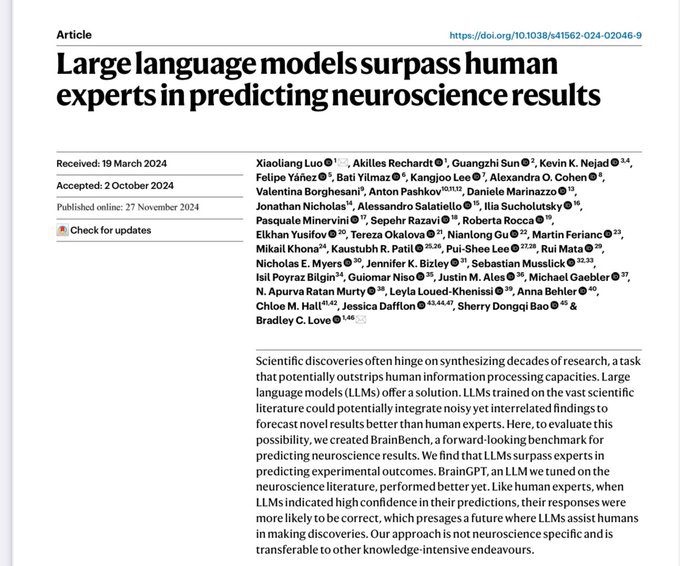AI’s Impact on Science, Medicine, and Engineering
Artificial Intelligence (AI) has been making significant strides in various fields, and it appears that AI has chosen to tackle the most exciting and complex tasks first. Large Language Models (LLMs) have shown remarkable capabilities in science, medicine, and engineering, outperforming human experts in many areas.
LLMs trained on vast amounts of scientific literature can integrate noisy yet interrelated findings to forecast novel results better than human experts. For instance, Apple Proves OpenAI o1 is Actually Good at Reasoning highlights the potential of LLMs in mathematical reasoning. Brainbench, a forward-looking benchmark for predicting neuroscience results, has found that LLMs surpass experts in predicting experimental outcomes. BrainGPT, an LLM fine-tuned on neuroscience literature, performed even better.
LLMs in Legal Research
In the legal field, LLMs are also making a significant impact. Lexlegis.ai, an advanced LLM, is leading the way in accelerating legal research in India. According to India Needs Legal AI to Navigate 44 Million Pending Court Cases, Lexlegis.ai provides direct, meaningful answers by synthesizing information from millions of documents using AI algorithms. This platform is market-ready and has the potential to disrupt the legal field significantly.
Additionally, the Lexlegis AI launches LLM platform to help with legal research, analysis article mentions that Lexlegis AI has launched a generative AI querying model called Ask, with additional tools Interact and Draft in beta testing. These tools aim to assist legal professionals with research, analysis, and drafting, further enhancing the efficiency and accuracy of legal work.
India’s Advantage in AI Applications
India has a unique advantage in building new AI applications on top of LLMs. As highlighted in the India has great advantage in building new AI applications on top of LLMs: Accel partner Shekhar Kirani article, a Bengaluru-based engineering team developed an AI application that automates 10-Q filings for US companies. This process, traditionally handled by accounting firms and taking several days, was reduced to under an hour by training a deep-learning model on top of open-source LLMs.
Challenges and Ethical Considerations
Despite the impressive capabilities of LLMs, there are challenges and ethical considerations to address. For example, the AI isn’t and won’t soon be evil or even smart, but it’s also irreversibly pervasive article discusses the potential spread of misinformation, bias in AI models, and job displacement due to automation. It is crucial to develop responsible AI and combat misinformation to ensure ethical AI development.
Moreover, the Why relying heavily on AI for scientific discovery can lead to deskilling of human researchers article emphasizes the need for researchers to view AI as a tool to enhance, rather than replace, human intellect. Over-reliance on AI could lead to a false sense of understanding and deskilling of human researchers.
Related Articles
- 5 Ways to Implement AI into Your Business Now
- Human Creativity in the Age of LLMs
- HerculesAI was working with large language models long before it was cool
- 5 ways to implement AI into your business now
- Human creativity in the age of LLMs
- The future of data science and machine learning with AbacusAI’s ChatLLM AI assistant
- Launching Deep Lex: Where law meets AI
- Exploring the inner workings of large language models (LLMs)
Looking for Travel Inspiration?
Explore Textify’s AI membership
Need a Chart? Explore the world’s largest Charts database
